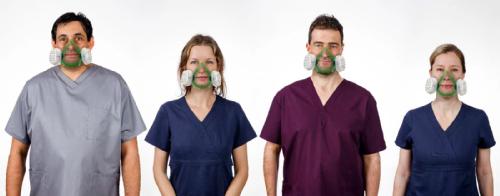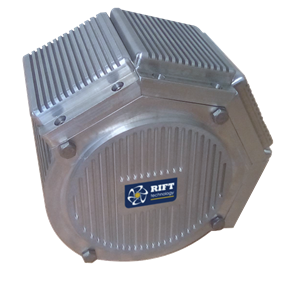Success Story Assetbank
Reusable and customised facemask to keep healthcare workers safe thanks to digital supply-chain
Throughout the pandemic the filtering facepiece 3 respirator (FFP3) mask was heavily in demand, as it is the most widely used respiratory protective equipment in UK healthcare system. However, according to a study with health workers from 32 hospitals, the overall fit-testing pass rates had a mean pass rate of 81%.
MyMaskFit with their NHS Nurse co-Founder saw this statistic in reality in setting up the COVID-19 Wards, and with inspiration from the Ventilator Challenge UK they have created a reusable, customised facemask to protect medical workers during and after the pandemic.
The mask is unique as it has:
- Fully customised fit according to individual’s face. This will ensure a high fit-testing pass rate and better protection.
- Different from the traditional one fits all masks, customised mask will also provide the most comfortable wearing experience that enable clinical workers wearing them for long time.
- Local 3D printing supply chain to ensure a fast and flexible reaction to the demand with short lead time.
However, to ensure MyMaskFit could be rolled out and mass produced it was important to secure a sustainable supply chain. This is where the WMG Supply Chain Research Group stepped in and helped MyMaskFit to create a digital solution, taking advantage of emerging distributed manufacturing.

Distributed manufacturing consists of using global and remote expertise, producing parts locally and diversifying supplier network productions, researchers from WMG decided to use distributed manufacturing to create a digital supply-chain marketplace, which is attractive to buyers and suppliers, as it uses the insight gained from other marketplace examples to address known barriers and issues. This means that companies can transform customer feedback into designs and products that can be achieved within days through such a dynamic and distributed supply chain.
The WMG Accelerator Team also helped, by leveraging their existing knowledge learned from UK Collaborative Commerce Marketplace (UKCCM). UKCCM is a digital marketplace created by WMG Accelerator Team, which aims to increase sales and lower costs through providing easy access to the core competences and capabilities of small and medium-sized enterprises.
MyMaskFits was then able to meet the classification of cloud-additive manufacturing with a touch of the platform's support (marketplace) to amplify the on-demand supply chain to a larger scale.
Carl Che from the WMG SCRG at the University of Warwick comments: “We are glad that our distributed manufacturing archetype and marketplace archetype helped MyMaskFit to form their business model from academic side. It feels great knowing a better mask can potentially help more NHS workers or even save more lives.
“From a macro perspective, two separated models (distributed manufacturing and B2B marketplace) perfectly help each other out. This project can potentially sketch out an emerging pattern of the future manufacturing in the UK.”
Paul Perera from MyMaskFits comments: “Our mask is unique as it is reusable and customisable, however in order for it to be mass produced and manufactured easily we needed a sustainable supply-chain in place.
“WMG at the University of Warwick have helped us meet our customer’s needs and expectations by helping us secure a sustainable and digital supply-chain, this means we can easily check our suppliers availability and prices and provide MyMaskFit quickly and at a competitive price.”
Discover more WMG success stories here.
For more information about this project, or working with us, please email wmgbusiness@warwick.ac.uk.
WMG supports RIFT Technology with a greener cost-effective electric motor
A cheaper and more environmentally friendly electric motor for electric vehicles is a step closer to market with the support of WMG at the University of Warwick.
WMG has provided valuable knowledge and expertise in developing a UK focused, cost-effective production and supply chain for RIFT (Reduced Induction Field Torque) Technology’s development of RIFT-10; a design for electric motor drives that reduces copper and magnet weight reduction by around 50% and lower cost by 75%.
The aim of the project was to help RIFT Technology; an R&D company bringing a product to market for the first time, advance RIFT-10 to a higher manufacturing readiness level (MRL 7), to get the motor closer to production, by rooting the supply chain in the UK, rather than abroad (given the disruption to supply caused by the pandemic) and supporting production of trial units.
WMG, is committed to delivering UK economic impact and achieving net-zero by supporting industry in accelerating new concepts to commercial reality. This supports the University of Warwick’s approach to sustainability - the Way to Sustainable – which focuses on the real-life implications of creating a sustainable future and the practical challenges of getting there - prioritising research expertise, sustainability in the curriculum, and developing solutions for the benefit of industry and society.
The team of experts at the University has facilitated the RIFT-10 project to deliver on creating revenue, jobs, CO2 reduction, and supply chain growth in the UK.
RIFT Technology has developed the RIFT 10-30 kW motor (RIFT-10) by taking an exciting innovation from their sister business (RIFT Actuators) and working with APC and the Niche Vehicle Network to get the motor to working prototype stage (installed on a G-Whiz). The novel electric motor configuration is proven to generate 10-30kW of power, torque from 0-400Nm and up to 10,000RPM as demonstrated with a prototype vehicle.

The RIFT 10 motor demonstrated unique advantages over conventional EV motors:
Environmental benefits of the project:
· The low sales cost and attractive features of RIFT-10 enable greater/earlier market adoption of EUV’s, resulting in a reduction of CO2 production over ICE vehicles.
· A RIFT-10 weight saving and efficiency over competing EV motor designs increase vehicle range, resulting in less energy usage over alternatives.
· With RIFT-10, equivalent power output is achieved using fewer raw materials (i.e., 85% reduced copper weight and ~85% reduced magnet volume), resulting in less earth material usage as well as fewer material costs.
· Less materials usage results in an estimated 75% reduction in CO2 produced during manufacture. Planned production efficiencies also lead to further CO2 reductions. An estimated 612,000 Tonnes of CO2 would be saved by year 5.
· Development of an EV motors supply chain in the UK for a UK and EU market reduces international shipping of components thus reduces related CO2 production.
Social benefits of the project:
· RIFT-10 creates/safe-guards 50+ much needed and good-quality manufacturing, sales, administration and R&D jobs in the Malvern area with an estimated X14 more UK jobs across the supply chain (over 5-years).
· Growth of RIFT-10 addresses the government’s priority area of ‘Smart Cities’ by allowing smart monitoring of vehicle fleets efficiency performance, usage and other data points. The use of the Internet of Things and resulting analysis can only be as strong as the data input. Traditional alternatives offer no smart functionality.
James Black, WMG Innovation Manager at the University of Warwick said, “The Covid-19 pandemic has been particularly difficult for SMEs and R&D-focused organisations that have previously relied on face-to-face networking events to find new partners, investors, and customers.
“WMG’s network means we’re in a great position to connect UK companies together to help them accelerate their product to the market, and we’re delighted that RIFT Technology has benefited from our extensive background for practical supply chain solutions that have delivered economic and societal value to the project.”
James O’Donnell, Technical Manager from RIFT Technology said, “As a research and development company bringing a product to market for the first time, RIFT Technology needed to bridge the gap between prototype and small-scale production. We had to answer difficult questions such as what to make and what to buy, high level questions such as how to develop a supply chain strategy and practical questions such as how best to select suppliers.
“With a unique blend of academic expertise and industrial experience from the University of Warwick, WMG’s Supply Chain and Operations Group were able to support us in our journey.”
The project took place during the pandemic, meaning several online workshops were carried out targeting topics such as strategic management, supplier selection and decision-making, and end-of-life strategies.
For further stories, click here.
For more information about this project, or working with us, please email wmgbusiness@warwick.ac.uk.
